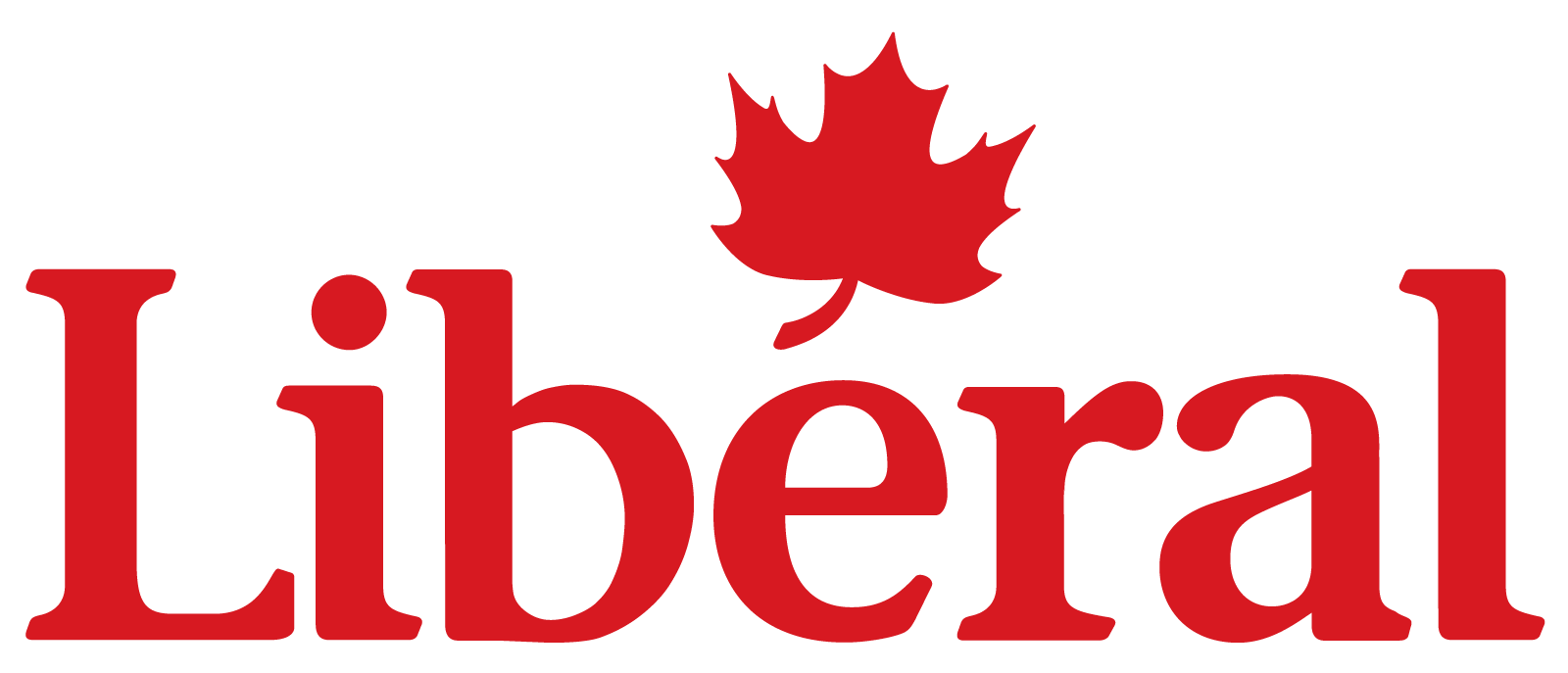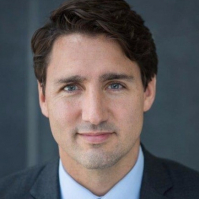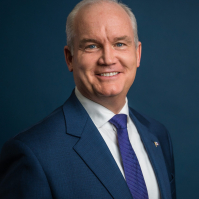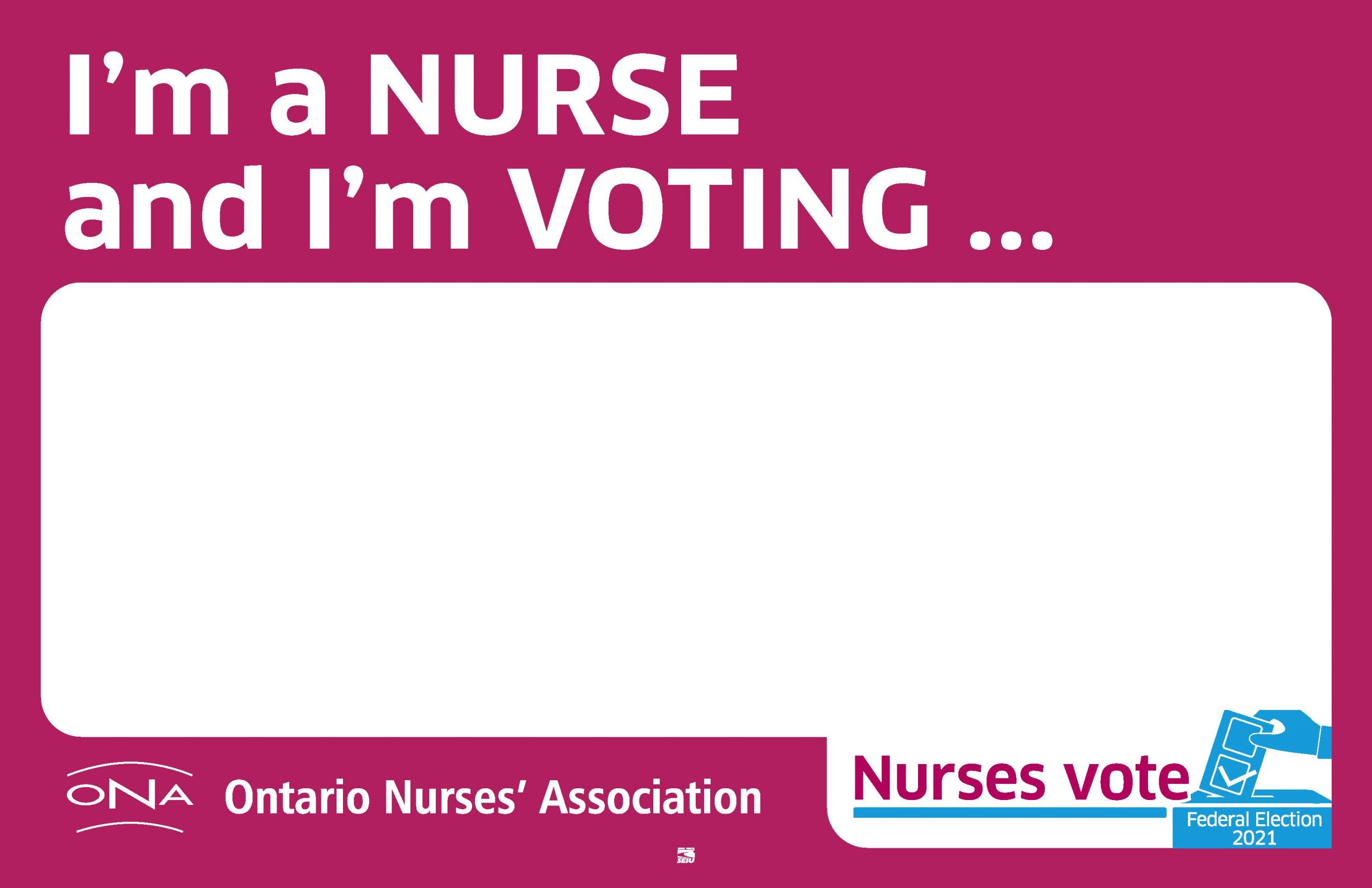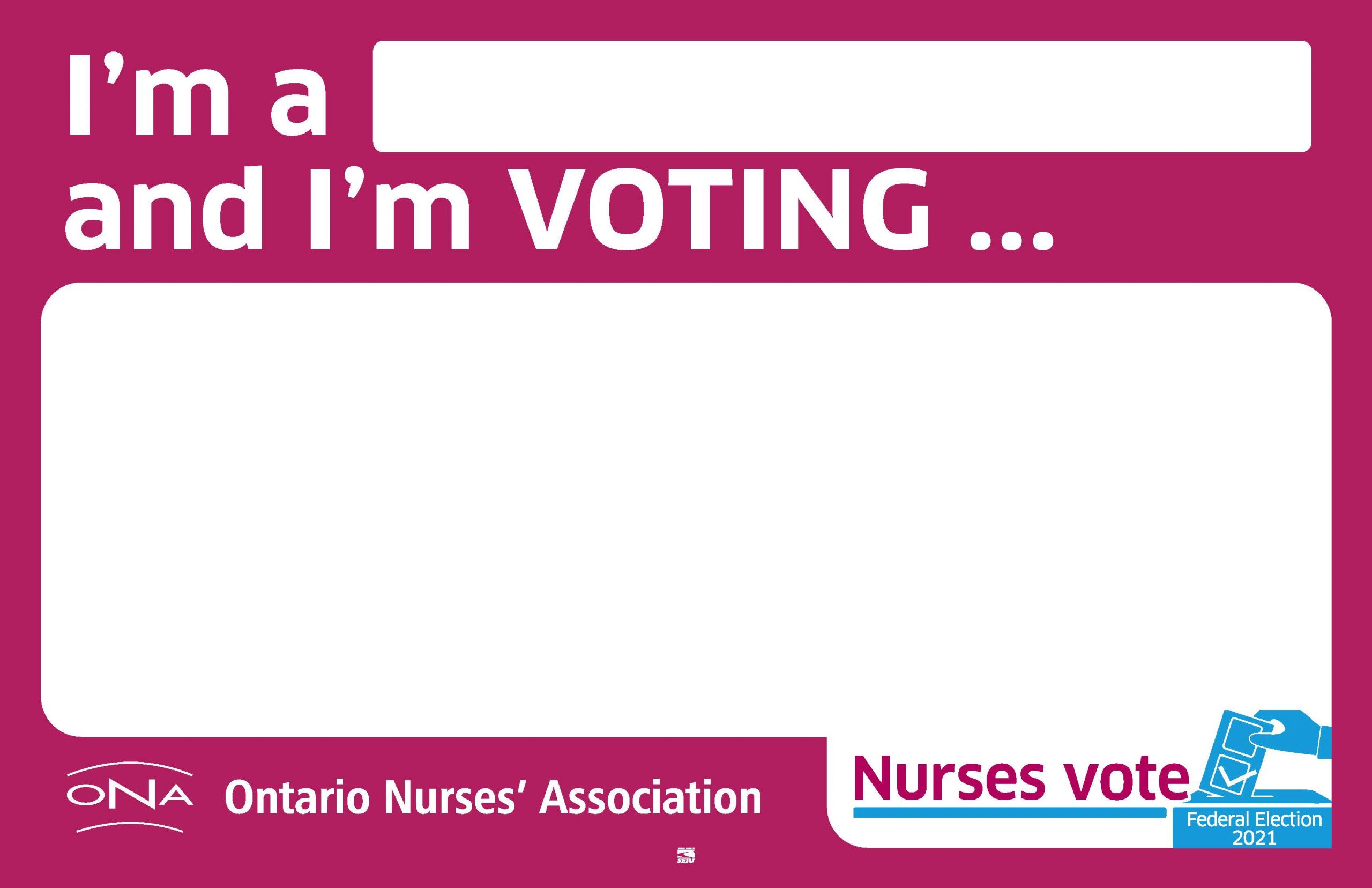
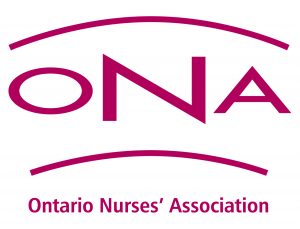
This federal election was called by the Liberal government of Prime Minister Justin Trudeau. Opposition parties did not support this election call and the Liberal government still had two years left in their four-year elected term. The next mandatory federal election is scheduled for October 2023. Nevertheless, Election Day will occur on September 20th and will include four major national political parties (the Liberal Party of Canada, the Conservative Party of Canada, the New Democratic Party of Canada and the Green Party of Canada) and one regional party (The Bloc Quebecois) that competes only in one province.
Elections Canada has announced four advance polling days, which will take place on the following dates, September 10, 11, 12, and 13. As well, Canadians can vote by mail by registering online, or by searching “vote by mail” in the search field at the electionscanada.ca website. The deadline to apply for a mail-in ballot is September 14, 2021.
Leader Debates
2021 Federal Election: Debate Broadcast Group Announces Venue, Dates and Moderators for Leaders’ Debates
Can you help us? Volunteer for our September 17 National Day of Action!
The federal election is only weeks away. We need your help to spread the word to ONA members about the importance of voting. If you can spare just a couple of hours on September 17, please join us!
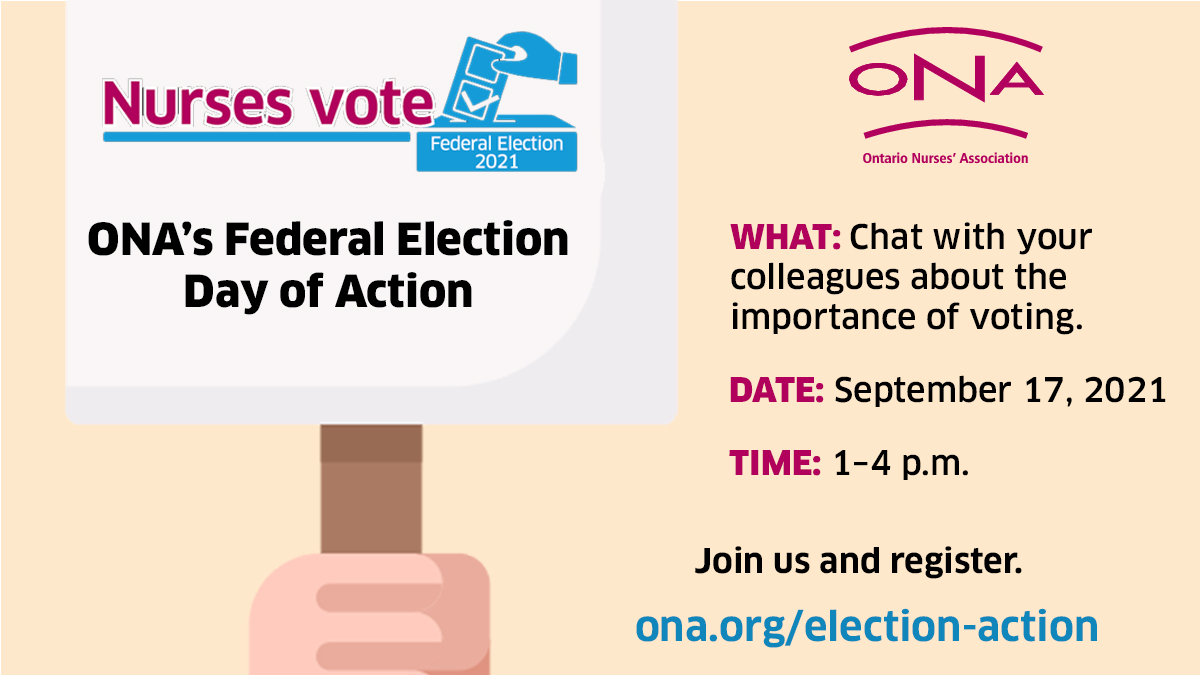

In the wake of the devastating COVID-19 pandemic, the federal government has a once-in-a-lifetime opportunity to change the course of Canada’s health-care system towards systemic improvements. The challenges are multi-faceted and the solutions, in turn, must be diverse. The following are the issues that ONA believes require immediate and urgent action by the federal government.

Click the party logos below to view more information about their platform.
Health-Care Staffing / Health Human Resources
Invest $3 billion to hire 7,500 family doctors, nurses, and nurse practitioners over four years.
Expand the number of family doctors and primary health teams in rural communities, by increasing by 50% (from $40,000 up to $60,000 over 5 years), the maximum debt relief that family doctors, residents in family medicine, nurse practitioners, or nurses are eligible for the under Canada Student Loans forgiveness program.
Work to hire up to 50,000 new Personal Support Workers in Long-Term Care and raise their wages, with a guaranteed minimum wage of at least $25 per hour.
Health-Care Funding / Canada Health Transfer
To date, there is no specific commitment on increasing the Canada Health Transfer. While in power, repeated calls from provincial premiers to increase the health care escalator — the annual increase to the health-care transfer — to 5.2 per cent from the current three per cent went unanswered.
Invest $10B to eliminate waitlists — $6B in new funding on top of $4B already committed in budget 2021; And $400 million over 4 years to expand virtual health care services.
Establish a new federal transfer to provinces and territories—the Canada Mental Health Transfer—to assist jurisdictions to expand the delivery of high-quality, accessible, and free mental health services. The initial investment will be $4.5 billion over 5 years.
Universal Pharmacare
To date, no commitment to universal pharmacare. Despite platform commitments in their 2019 election platform, progress on universal pharmacare has been stalled in Canada under the federal Liberals.
National Standards for Long-Term Care
Work with provinces and territories to introduce the Safe Long-term Care Act to ensure that standards of care are upheld across the country.
To date, there is no specific platform commitment to getting profit out of long-term care.
Health-Care Staffing / Health Human Resources
To date, there have been no specific commitments regarding hiring nurses.
Provide priority in immigration programs to those who can work as Personal Support Workers in Long-Term Care or homecare. Promote PSW jobs through immigration and refugee settlement programs.
Work with the provinces to harmonize ICU training to ensure that ICU credentials are transferable among jurisdictions so that that capacity can be bolstered in emergencies.
Health-Care Funding / Canada Health Transfer
Propose a new health agreement with the provinces and territories that boosts the annual growth rate of the Canada Health Transfer to at least 6 per cent. The party says that this will inject nearly $60 billion into our healthcare system over the next ten years.
Universal Pharmacare
To date, no commitment to universal pharmacare. The platform states that the party will negotiate constructively with the industry to reduce drug prices while providing long-term regulatory certainty.
National Standards for Long-Term Care
To date, there has been no commitment in support of national standards for long-term care. Conservative Party Leader Erin O’Toole is on record rejecting proposals for national standards for long-term care.
In addition, the platform has no specific commitment to enforcing the Canada Health Act to protect public health care and get profit out of long-term care. As part of the party’s platform commitment to strengthen Health Canada is a commitment to “partner with the private sector rather than over-rely on government.”
Health-Care Staffing / Health Human Resources
Health-Care Funding / Canada Health Transfer
To date, the party has said they are prepared to increase the Canada Health Transfer but they have not specified a specific amount. The platform does state that the party is “committed to strengthening public health care – and expanding it to make sure everyone is covered for the care they need to get and stay healthier longer.”
Universal Pharmacare
Implement ‘health care that covers us from head to toe,’ including funding for the $10 billion required for pharmacare to make sure that all Canadians can access the prescription medicine they need with their health card, not their credit card – saving money and improving health outcomes for everyone.
National Standards for Long-Term Care
End private, for-profit long-term care and bring long-term care homes under the public umbrella, beginning with the federally-owned long term care company Revera.
Work with stakeholders to develop national care standards for home care and long-term care, regulated by the same principles as the Canada Health Act. Federal funding will tied to meeting these standards, and include determining a core basket of home care services that will be available and covered by provincial insurance plans, and setting minimum national care standards for long-term care residents. Paying and protecting long term workers will also be an essential part the party’s approach to national standards.
Health-Care Staffing / Health Human Resources
Increase and stabilise staffing in LTC homes and improve training, fair pay for workers, benefits, and paid sick leave.
Invest in training and education to support ongoing professional development and specialization for LTC workers.
Prioritize senior care and long-term care skills for immigration status.
Health-Care Funding / Canada Health Transfer
To date, there is no specific commitment on increasing the Canada Health Transfer. The platform does state that the party will re-evaluate the Canada Health Transfer so that rural communities are being covered with an equitable amount of funding to meet the needs of the community.
Universal Pharmacare
Expand the Canada Health Act by fully funding a universal pharmacare program. Create a bulk drug purchasing agency and reduce drug patent protection periods. Establish a clear timeline for the implementation of universal pharmacare.
National Standards for Long-Term Care
Bring Long-Term Care under the Canada Health Act Universal care will ensure that every person in long-term care in Canada has access to quality, affordable care.
Improve the quality of care in Long-Term Care facilities, including creating enforceable National Standards for LTC and setting a national standard of four hours of regulated care per day for each LTC resident.
End for-profit LTC facilities and reorient LTC towards community-based models.

Learn to effectively use social media throughout the Federal Election campaign.



